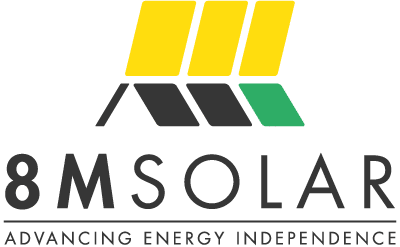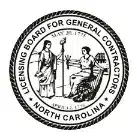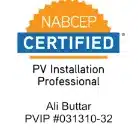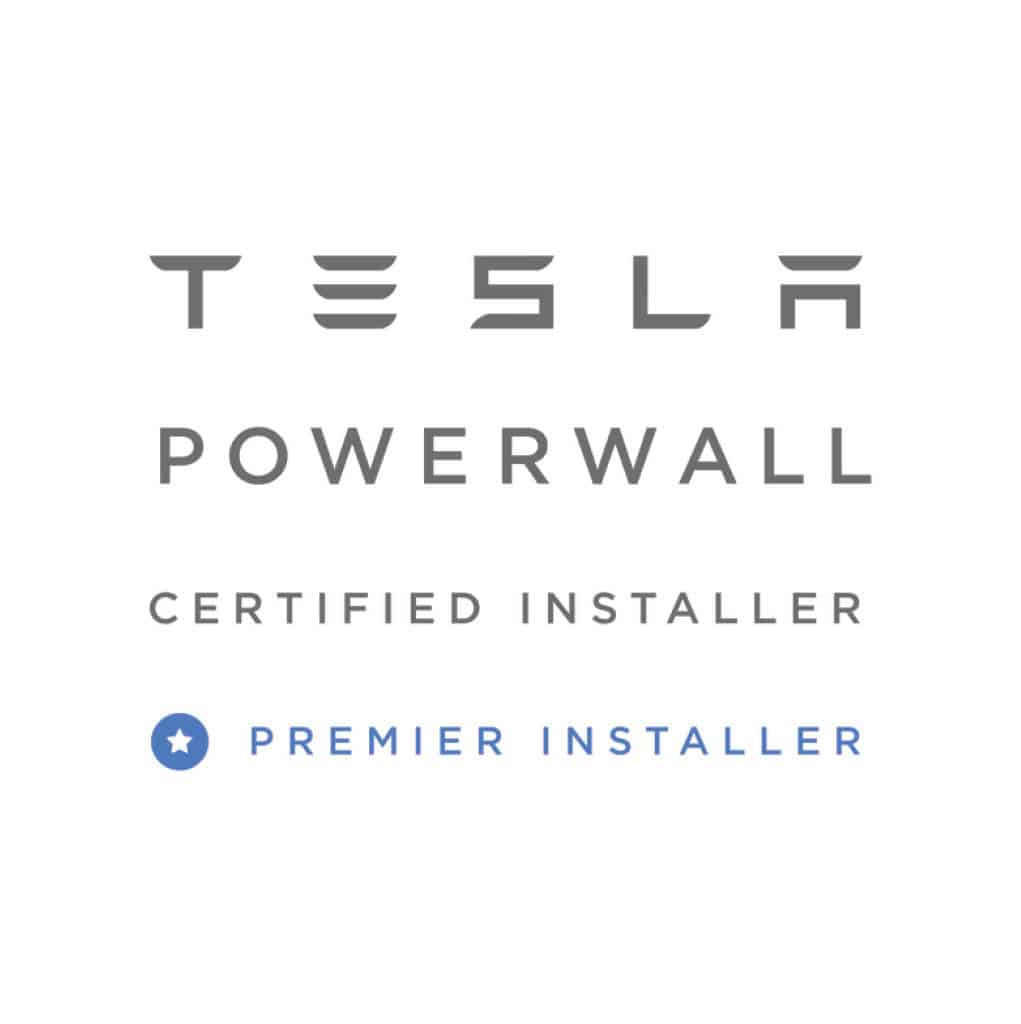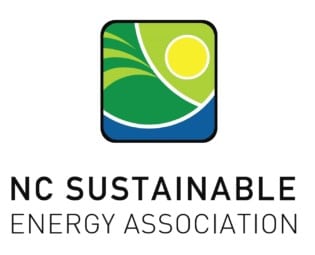A Guide to Solar Energy Behavior
When the power goes out and the lights go dark, many homeowners with solar panels often wonder, “How does solar work when you lose power?” This is an important question because it impacts your home’s energy supply and safety during an outage. Solar panels are typically connected to the grid, meaning they rely on grid power to function when the electricity is down. Without additional features, solar panels will shut off during an outage to prevent backfeeding, which could be dangerous for utility workers trying to restore power.
When combined with battery storage, solar panels can provide backup power during a grid failure. A solar battery allows your system to store excess energy generated during sunny days, which can be used to power your home during outages. This setup keeps your home powered even when the grid goes down, offering peace of mind and energy security. By investing in solar with battery storage, you can keep your essential appliances running and enjoy energy independence during power interruptions.
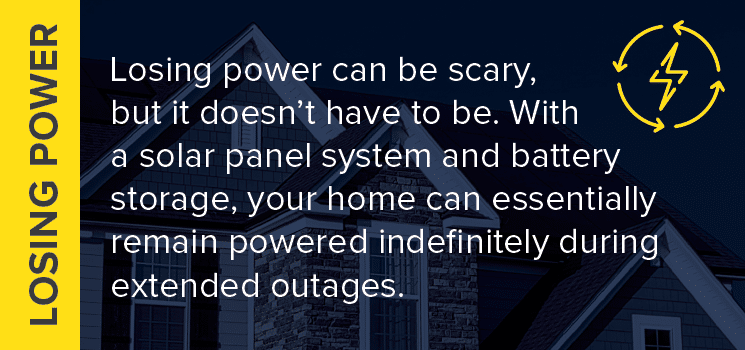
The Interconnected Grid and Solar Panels
Solar panels work by converting sunlight into electricity, reducing your reliance on traditional utilities and lowering your energy costs. During the day, they generate power for your home, and any excess energy is often sent back to the grid, further reducing your utility bill. When power outages occur, the relationship between your solar panels and the grid becomes more significant. In most systems, solar panels work with the grid to maintain a steady electricity supply. When the grid is active, excess energy can be sent back to it, helping you save on your energy bills. Here’s how this connection plays a role during a power outage:
- Grid-Tie Systems: Most residential solar installations are grid-tied systems. This means that the solar panels are connected to the local electricity grid. Excess energy produced by the panels can be fed back into the grid, and when your panels aren’t producing enough energy, you can draw power from the grid.
- Net Metering: This system allows homeowners to receive credit for excess electricity sent back to the grid, effectively reducing their electricity bill.
The Role of Inverters in Solar Power
Inverters are a crucial part of solar power systems, acting as the bridge between the energy generated by solar panels and the electricity that powers your home. Solar panels produce direct current (DC) electricity when exposed to sunlight, but most household appliances require alternating current (AC) to function. Inverters convert the DC power generated by the panels into AC power, making it compatible with your home’s electrical system. This conversion process allows you to use the energy produced by your solar panels to run lights, appliances, and other devices in your home. Without inverters, solar energy would not be usable for everyday purposes.
Here are some key functions of inverters:
Energy Conversion: The inverter’s main role is to convert the DC energy generated by solar panels into AC energy that can be used to power household appliances, lights, and electronics. This conversion is important because the majority of electrical systems in homes are designed to operate on AC power.
Grid Synchronization: Inverters also help synchronize the energy produced by the solar panel system with the utility grid. They make sure that the electricity being fed back into the grid matches the grid’s frequency and voltage. This is vital to prevent damage to the grid and create a smooth, safe exchange of energy between the solar system and the utility.
Maximizing Efficiency: Inverters play an important role in optimizing the performance of the solar system. Many modern inverters come with advanced algorithms to track the solar panel’s output, adjusting the flow of electricity based on varying environmental conditions, like sunlight intensity. This helps to maximize the efficiency of the system and ensures that the panels are always working at their peak potential.
Safety and Protection: Inverters are equipped with safety features that protect both the solar power system and the home’s electrical system. For example, inverters can detect abnormal conditions like system faults or grid fluctuations, and shut down the system if necessary to prevent potential hazards, like electrical fires or damage to equipment.
Monitoring and Communication: Many inverters come with built-in monitoring capabilities, allowing homeowners to track the performance of their solar system in real-time. They can communicate data to mobile apps or web interfaces, giving users insights into energy production and consumption as well as alerting them to potential issues or maintenance needs.
Integration with Battery Storage: Inverters also play a key role when paired with battery storage systems. They help manage the flow of electricity to and from the battery, ensuring that excess energy produced during the day is stored for later use, and that the home can draw from the battery when solar production is low or during power outages.
Inverters are indispensable for the proper functioning of solar power systems. Without them, solar-generated electricity wouldn’t be compatible with the home’s electrical system or the utility grid. With ongoing advancements in inverter technology, they continue to improve efficiency, safety, and ease of use for solar energy systems.
Safety Regulations and Power Outages
During a power outage, federal safety regulations require solar panel systems to automatically shut off to protect utility workers and the solar system itself. These safety measures are in place to reduce risks and ensure that solar energy systems do not pose a hazard during grid failures. Here’s how these safety features work to provide protection in such situations:
Protection of Utility Workers: One of the main safety concerns during a power outage is safeguarding utility workers who are repairing power lines. If your solar panels continue to feed electricity back into the grid during an outage, it could present a serious hazard to workers who are unaware that the grid is still energized. The automatic shut-off feature isolates any power generated by the solar system from the grid, effectively keeping utility workers safe as they carry out their repairs. This is an important part of the safety protocol to avoid accidents and see that workers can complete their tasks without the risk of electrical shock.
Preventing Islanding: Another key safety feature is the prevention of “islanding.” Islanding occurs when a portion of the grid, often powered by solar energy, continues to operate independently while the rest of the grid is down. This situation creates the potential for dangerous conditions, as part of the grid remains energized while utility workers are attempting to restore power. To prevent islanding, inverters automatically shut down the system during an outage, making sure that no power is fed back into the grid. This feature is designed to protect workers and avoid the possibility of unintended electrical hazards, while also making certain that the solar system complies with federal regulations.
These built-in safety mechanisms are essential for the responsible operation of solar panel systems during power outages. They maintain grid stability, protect utility workers, and help solar systems adhere to safety regulations, contributing to a safer and more secure energy environment for everyone involved.
Solar Panels and Battery Storage
The solution to maintaining power during an outage is to pair solar panels with battery storage systems. With a battery included in your system, you are able to utilize the solar panels as well as the battery to power the home during an outage. Here’s how battery storage helps:
- Storing Excess Energy: During peak sun hours, solar panels often produce more electricity than a home can use. Battery storage systems store this excess energy for later use.
- Maintaining Power During Outages: If the power goes out, a home with a battery system can use the stored energy to power the home.
- Increased Energy Independence: With a battery system, a home can rely less on the grid, achieving greater energy independence.
By understanding the role and benefits of these components, we can better appreciate the resilience and safety features inherent in modern solar panel systems.
The Benefits of Battery Storage
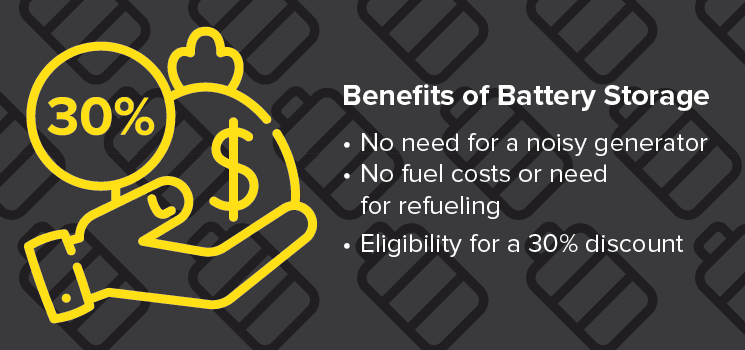
With a solar panel system and battery storage, your home can essentially remain powered indefinitely during extended power outages. Solar energy systems paired with battery storage offer a reliable solution for keeping your home powered when the grid goes down. Here’s how these systems work to provide energy security during an outage:
No Need for a Noisy Generator: Traditional backup generators are known for their loud noise and disruption, especially when used for extended periods during long outages. These generators can be a nuisance to your family, neighbors, and even pets. In contrast, a solar-powered system with battery storage operates quietly, offering an unobtrusive solution to backup power. You can rely on the stored energy in your solar battery, avoiding the noise, emissions, and maintenance associated with gas-powered generators while still keeping your home fully powered.
No Fuel Costs or Need for Refueling: Unlike gas-powered generators, which require regular refueling and come with fluctuating fuel costs, a solar energy system with battery storage offers a more efficient and cost-effective option. Your solar panels continue to capture sunlight, storing excess energy in the battery for later use, so you never have to worry about running out of fuel. This system eliminates the need for ongoing fuel expenses or the inconvenience of having to refuel during an outage, providing a more sustainable and long-term solution for backup power.
Eligibility for a 30% Federal Tax Credit: One of the major benefits of installing a solar energy system with battery storage is the opportunity to take advantage of the 30% Federal Solar Tax Credit. This incentive offers a reduction in the overall cost of installing solar panels and battery storage, including equipment and installation fees. By making this investment, you not only secure energy independence for your home but also benefit from financial incentives that make solar power more affordable. This tax credit is designed to help homeowners reduce their upfront costs and promote the adoption of clean, renewable energy systems.
Solar panel systems with battery storage provide homeowners with the peace of mind that they will have a reliable power source during unexpected outages, all while reducing their carbon footprint. With the sun as a free and renewable resource, you can enjoy greater energy independence without the added concerns of ongoing fuel costs or the inconvenience of refueling during an emergency.
8MSolar is Here to Help:
When you’re wondering how solar works during an outage, the answer is simple: with battery storage. By combining solar panels with a storage solution, you can ensure that your home stays powered, even when the grid is down. 8MSolar is here to help you design and install the ideal solar energy system to keep your lights on—whatever the weather. Our team is dedicated to helping you take full advantage of solar energy, giving you peace of mind that your power needs are met during any outage.
